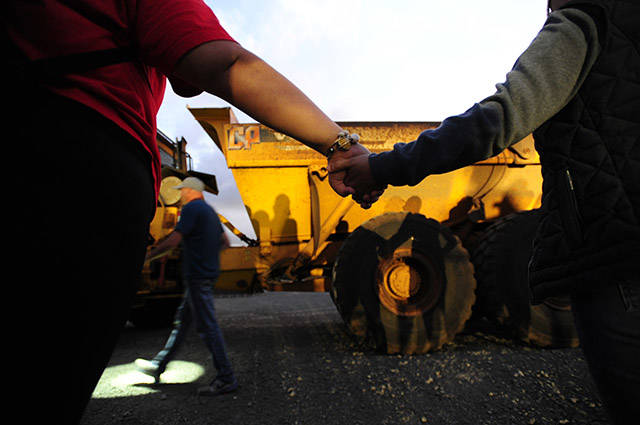For the third time
this year, there were mass arrests of peaceful protesters in
Hawaii, and some are wondering what is happening to our often complacent, go-along-to-get-along,
anything-goes state.
After all, the hugely troubled rail is getting sort-of built right in the middle of the busiest daily commute where all can see and nobody popped a tent and held a sign to stop that. (Not yet, at least.)
What’s going on is that people don’t feel that their voices are heard.
Oh, sure, politicians and “community engagement professionals” representing various development projects will hold meetings in a school cafeteria a couple of times before the construction vehicles start rolling. They’ll have serious looking people in reverse-print aloha shirts sitting impassively through hours of testimony and earnest pleas.
They may even call these meetings “listening sessions,” which means that they won’t answer any questions, and then they’ll go ahead and do whatever they planned to do all along, though perhaps they’ll write a check to a community organization or an after-school program to try to buy some acquiescence. It’s too often about quelling the voices of opposition, not giving them credence.
But community members — moms and dads who work all day at jobs they don’t even like just to afford to live in the same town where they grew up, grandparents who worked hard all their lives thinking of the future, grandparents who are spending their
retirement years raising their grandchildren, people who just want to go about their lives without undue burdens — they don’t feel heard. Listening is not hearing. Truly hearing the voices of the community means taking the messages to heart and being open to changing plans or waiting until all questions are
addressed.
The conflicts at Mauna Kea, Sherwoods and
Kahuku are different and complex in their own way, but the underlying message from the demonstrators at each site is that government leaders didn’t take their issues seriously so they felt compelled to stand up to protect the area themselves.
So they have put up tents, camped overnight and put their bodies in the path of construction equipment.
But where are the negotiators, the community-
builders, the soft-spoken
facilitators who can bring opposing sides together to some sort of agreement?
Everyone seems so dug-in and unyielding, especially government, which always seems to side with the
developer and never with the taxpayers and voters for whom the fight is deeply personal.
Every Hawaii politician who campaigned on renewable energy and eco-this, sustainable-that and all the “voice of the people” blah blah should get out of their air-conditioned offices and drive out to Kahuku regardless of which district they represent. They should bring sandwiches, a box of manapua and an open mind, and they should listen and really hear.
It’s easy to support something when you’re miles away in an upstairs office or filming a soft-focus campaign commercial. True leadership is being face to face with the stakeholders on their turf, hearing their opposition and helping to find ways out of these impasses that will build community rather than watch on video feeds while kupuna get arrested.

